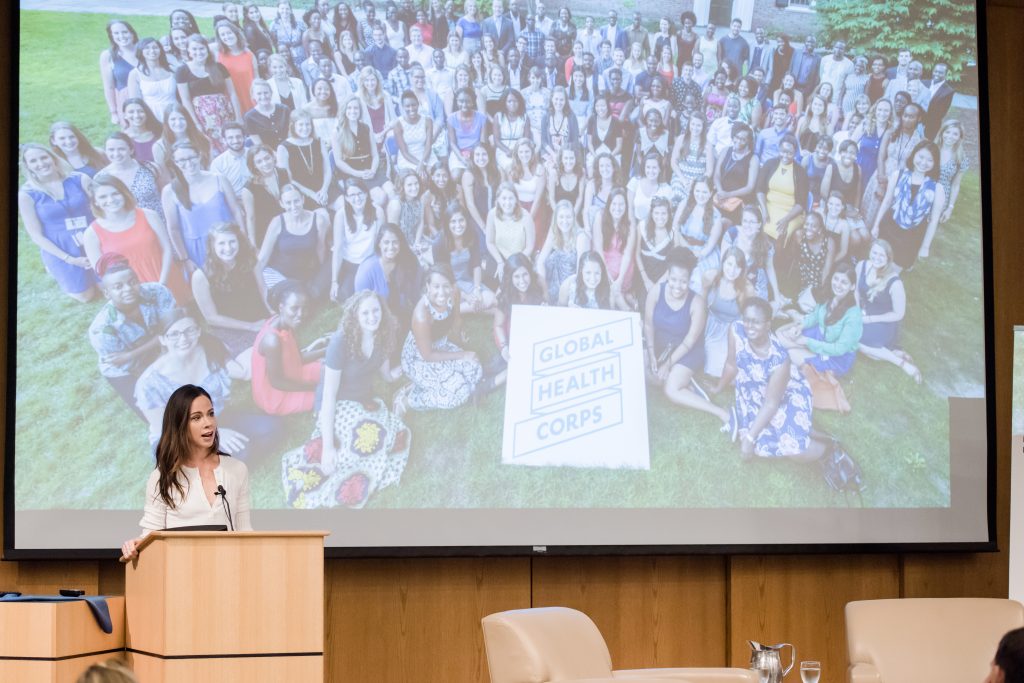April 2016
Tuberculosis. Zika Virus. High newborn and maternal death rates. Global health challenges such as these can seem insurmountable in the face of funding gaps, slow moving bureaucracies, infrastructure weaknesses, and other system-level challenges. This year at the Sustainable Business and Social Impact Conference the CEO and Co-Founder of Global Health Corps, Barbara Bush, discussed how the organization is tackling these challenges and what she sees as pivotal to innovating the field of global health.
Global Health Corps was founded in 2009 with the mission of mobilizing “a global community of emerging leaders to build the movement for health equity,” bonded by the belief that health is a human right. Global Health Corps competitively recruits 21 to 30-year-olds from around the world who bring diverse professional backgrounds and a passion for social justice to serve as fellows for a year within high impact roles at health organizations in the US, Eastern and Southern Africa. Fellows work across issue areas on real-time health equity challenges that have been identified by partners.
The curriculum kicks off with a two-week Training Institute, including a workshop with CASE Senior Fellow Dan Heath, and continues to support the fellows’ leadership development throughout the year with ongoing leadership training curriculum, emphasizing systems-thinking, good management, and key leadership traits. Fellows are paired together in teams of two which allows them to collaborate, share knowledge, and build a strong, vast leadership network.
During the talk, Bush highlighted three areas she has found key in making progress on global health issues:
Global health leaders need to be diverse
In the spirit of tri-sector leadership, Bush emphasized that future leaders in global health must come from diverse backgrounds. Global Health Corps recruits professionals from a variety of backgrounds, including computer science, supply chain management, political science and journalism. They also come from many different countries with various professional and personal backgrounds. This diversity is key in not only representing different viewpoints and cultural considerations but also in bringing a fresh set of eyes to persisting challenges in global health.
Global health needs to be a global dialogue
A common perception in the field of global health is that a small group of people, often hailing from a certain set of countries, makes many of the major decisions on how to fund and tackle key challenges. Bush insisted that we should be very deliberate about incorporating the expertise and opinions from a variety of backgrounds, including the communities that are ultimately affected. Global Health Corps appoints a fellow from the hosting country in each placement to help ensure that projects are undertaken with the local lens incorporated, which also contributes to the sustainability of any knowledge or outcomes gained.
Global health is not just an issue outside the United States
Many of the issues faced by urban areas of developing countries also affect urban populations in the United States. As an example, Bush pointed out that 1 in 20 people in Washington DC are HIV positive, a rate similar to that found in parts of Sub-Saharan Africa. Often the challenge in the United States is less about the creation of healthcare systems but on moving big systems towards addressing these issues. As noted above, the Global Health Corps program always places two fellows in a partner organization – one from the United States and one from the host country. When projects are actually based in the United States, the program still engages one fellow from another country. Global Health Corps has found that having fellows from outside the United States provides a fresh perspective to issues urban areas are facing and suggesting innovative approaches that may already be in place in their home countries.
For example, a fellow from Nigeria worked with the Mayor of Newark’s office to pilot a community health worker system to address the healthcare professional shortages in that city. While community health workers are common in countries like Nigeria, they’re rare in the United States. Sometimes it takes a look from someone outside of the system to identify the gaps and provide solutions.
As our work with the Social Entrepreneurship Accelerator at Duke (SEAD) has shown us and the Global Health Corps work also highlights, it takes a range of skill sets and expertise to address global health challenges. These system-wide changes require collaboration between entrepreneurs, politicians, engineers, and others along with the medical professionals traditionally seen as leaders in global health. As Barbara Bush reiterated in her keynote address, “Diversity is critical because we want as many different ways of thinking on the table as possible.”
To learn more about the Global Health Corps, visit their website.


